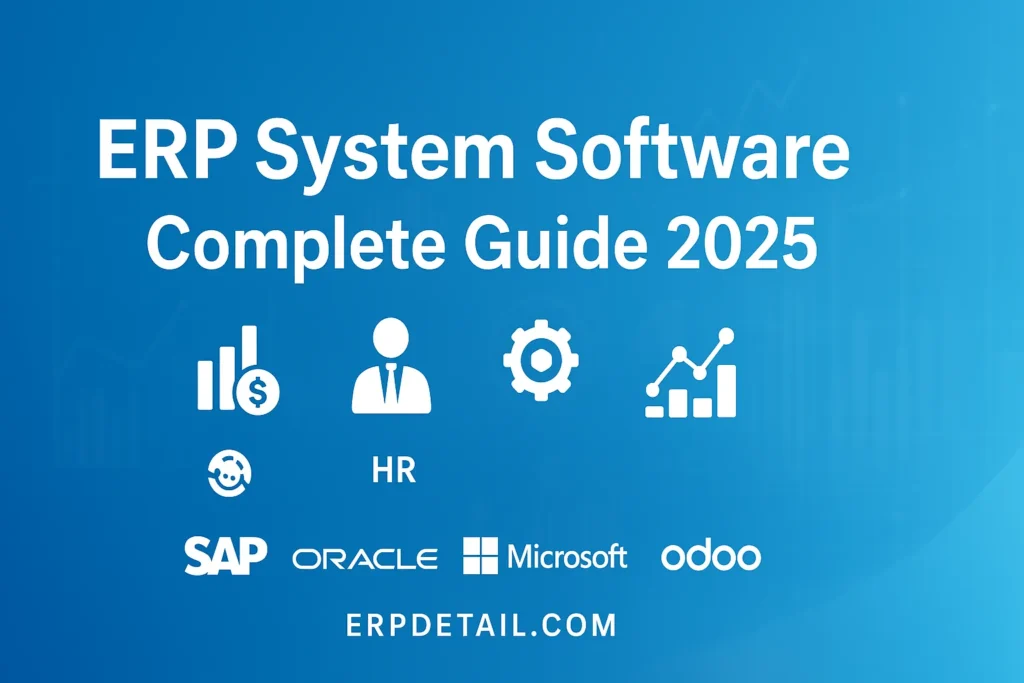
Discover everything about ERP system software in 2025 – from core features, benefits, and ERP modules to top ERP vendors like SAP, Oracle, and Microsoft. Learn how ERP helps businesses boost efficiency, streamline operations, and drive digital transformation.
Introduction to ERP System Software
Enterprise Resource Planning (ERP) system software has become an essential tool for modern businesses of all sizes. Whether it’s a small startup or a global enterprise, ERP solutions help companies manage resources, streamline processes, and boost overall efficiency. By integrating financials, supply chain, human resources, and customer management into one platform, ERP software empowers organizations to make smarter, data-driven decisions.
What is ERP System Software?
ERP system software, also known as enterprise resource planning system, is a digital solution designed to centralize business operations. Unlike traditional software that handles only a single department, ERP brings together different modules such as finance, HR, inventory management, and CRM into one unified platform. This integration allows for better visibility and communication across departments.
Key ERP features include:
- Financial management & accounting software
- Human resource (HR) module
- Inventory & warehouse management
- Supply chain planning
- Customer relationship management (CRM)
- Analytics, dashboards, and reporting tools
Core Features of ERP Software
ERP system software is designed to handle multiple aspects of business operations. Some of the most important ERP modules include:
- Financial Management – Handles budgeting, billing software, payroll, and compliance.
- Human Resources – Includes recruitment, payroll module, and employee management.
- Supply Chain & Logistics – Improves order tracking, purchase management, and warehouse operations.
- Customer Management – Helps manage sales, CRM integration, and customer service.
- Analytics & Reporting Tools – Provides real-time dashboards, predictive analytics, and business intelligence.
Benefits of Implementing an ERP System
Businesses invest in ERP solutions because of the wide range of ERP benefits they bring:
- Efficiency and automation: ERP automation tools eliminate repetitive tasks.
- Centralized data: Improves decision-making with real-time reporting.
- Scalability: ERP scalability supports SMEs, startups, and large corporations.
- Integration: ERP integration with CRM and other tools reduces data silos.
- Competitive advantage: Faster operations, better customer service, and stronger compliance.
Types of ERP System Software
Different organizations require different ERP deployment models:
- On-Premise ERP – Installed locally on company servers.
- Cloud ERP Software – A SaaS solution hosted in the cloud.
- Hybrid ERP – Combines on-premise ERP with cloud adoption.
- Industry-Specific ERP – Tailored ERP for manufacturing, healthcare, retail, logistics, construction, or government.
ERP for Different Business Sizes
ERP isn’t only for large corporations. Today’s market offers flexible solutions for all:
- ERP for Small Business – Affordable cloud-based ERP software for startups.
- ERP for Medium Enterprises – Customizable solutions with more advanced ERP modules.
- ERP for Large Corporations – Scalable platforms with multi-location and global compliance features.
Leading ERP System Software Providers
The ERP market is dominated by both global giants and open-source vendors. Some of the top ERP systems include:
- SAP ERP – A leading ERP solution for enterprises.
- Oracle NetSuite – Strong in finance and global compliance.
- Microsoft Dynamics 365 – Known for CRM and business intelligence integration.
- Odoo ERP – A flexible open-source ERP solution.
- Sage ERP – Popular among SMEs.
When conducting ERP vendor evaluation or creating an ERP comparison chart, these providers often stand out.
How to Choose the Right ERP System Software
Selecting the right ERP solution requires careful planning:
- Consider ERP system cost and total cost of ownership.
- Check ERP customization and flexibility options.
- Review ERP comparison guides and software reviews.
- Evaluate vendor support, training, and managed services.
- Align ERP selection with future business growth and digital transformation goals.
ERP Implementation Process
Implementing an ERP system is a strategic decision. The process typically involves:
- Planning & Requirements Analysis – Define business goals and ERP project management needs.
- Customization & Integration – ERP integration with CRM, accounting, or supply chain tools.
- Training & User Support – Proper ERP user training ensures adoption.
- Post-Implementation Optimization – Performance tuning, upgrades, and continuous improvement.
Future Trends in ERP Software
ERP is constantly evolving to match digital demands. Some future ERP trends include:
- AI & Machine Learning – AI-powered ERP analytics and predictive insights.
- Mobile ERP Apps – ERP enterprise mobility for field teams.
- IoT & Industry 4.0 Integration – Connecting ERP with IoT devices and automation tools.
- Cloud ERP Migration – Increasing SaaS adoption for flexibility.
- Business Intelligence – Advanced dashboards and data-driven ERP decision-making.
Conclusion
ERP system software is no longer a luxury; it’s a necessity for businesses aiming to thrive in a competitive market. With benefits like automation, scalability, and better data insights, ERP solutions continue to play a vital role in digital transformation. From small startups to multinational corporations, the right ERP software provides a powerful foundation for growth, efficiency, and innovation.
What is ERP system software?
ERP (Enterprise Resource Planning) system software is a digital solution that integrates key business functions such as finance, HR, supply chain, inventory, and customer management into one centralized platform for improved efficiency and decision-making.
What are the main benefits of ERP software?
The main benefits include automation of processes, real-time reporting, better data management, reduced costs, scalability for business growth, and improved collaboration across departments.
Which businesses should use ERP system software?
ERP is suitable for all types of businesses – small businesses, medium enterprises, and large corporations. There are industry-specific ERP solutions for manufacturing, retail, healthcare, logistics, construction, and government.
How much does ERP software cost?
ERP system cost varies depending on deployment model, vendor, customization needs, and company size. Cloud ERP solutions are generally more affordable for small businesses, while large enterprises often invest in more complex, customizable ERP platforms.
Who are the top ERP software providers?
Some leading ERP vendors are SAP, Oracle NetSuite, Microsoft Dynamics 365, Odoo, and Sage. Each offers different features, pricing models, and customization options.
